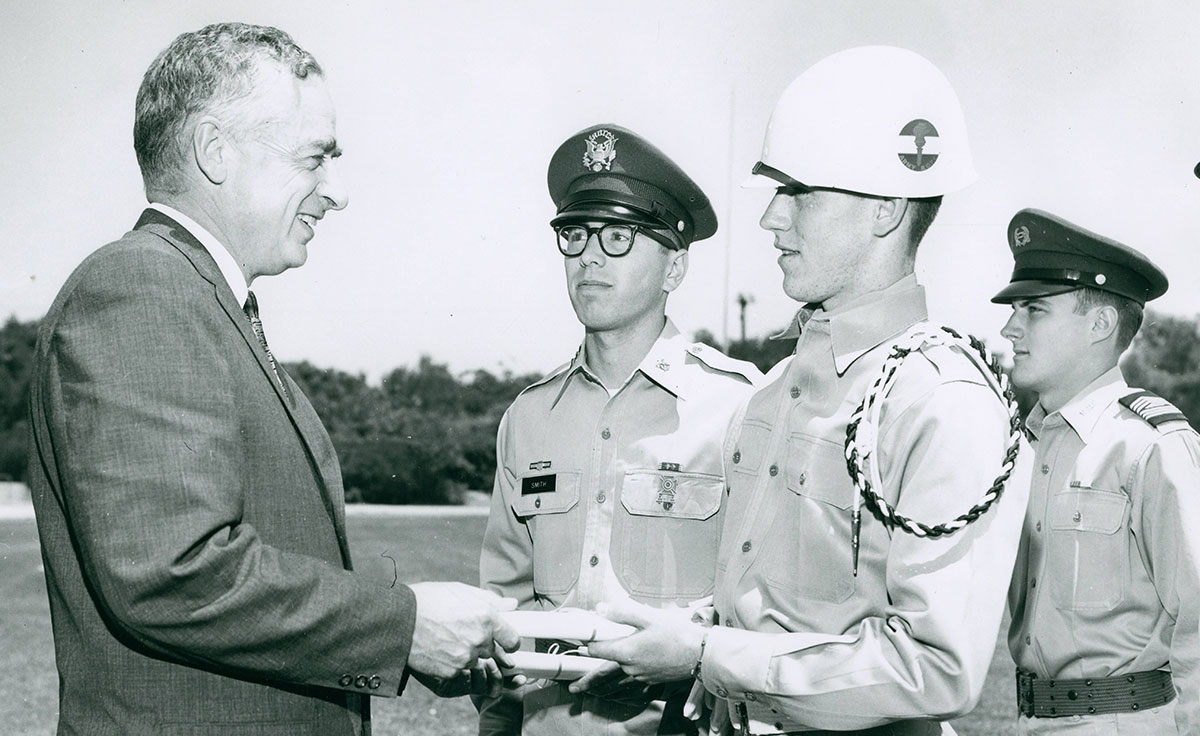II. CMC’s Founding Vision and Mission

Since 1946, Claremont McKenna College’s fundamental mission has been to prepare students for thoughtful and productive lives and responsible leadership in business, government, and the professions.1
To fulfill this mission, CMC’s founders focused what they described as the Original Idea of an undergraduate education that was a rationally balanced education to meet the political, economic, social, and cultural needs of students so as to prepare them for tomorrow’s world of affairs.2 Specifically, the College’s founders envisioned CMC as a residential liberal arts college that would be distinguished by its focused academic program and its commitments to responsible leadership and research.
The founding vision called for:
- A sharply focused academic program defined by:
- A core liberal arts curriculum representing disciplines across the social sciences, sciences, and the humanities, which the founders deemed essential to the full development of every student;3
- An emphasis in economics and government, including the expectation that all students would engage with the economic and political problems of the day;4 and,
- Excellence in every academic department at the College, and coordination of its academic program with majors and programs offered within The Claremont Colleges and at other leading colleges and universities.5
- A faculty of “top-quality teacher-scholars”6 that, “in the best tradition of a liberal arts college, [would] foster critical inquiry through close student-faculty relationships, both in the classroom and through research and scholarship.”7
- An academic and learning environment distinguished as:
- Interdisciplinary: CMC was “established as an experiment in educational unity. … [CMC’s] founders were determined to extend the concept of integration, to build a college in which the humanities, biological sciences, and social sciences were not only integrated with themselves, but with each other.”8
- Balanced in Economic and Political Perspectives: “Convinced that many students hear only one side of the issues of the day, they planned a faculty representing diverse opinions and a college hospitable to controversy.”9
- Ethical: “In preparing students for responsible leadership in modern society, the importance of strong ethical foundations cannot be overestimated.”10
Also essential to the character of CMC is its membership in The Claremont Colleges consortium. CMC remains committed to a mutually supportive framework of working in partnership with the other members of the Consortium. CMC expects to be able to build strategically on its comparative strengths while drawing selectively on the strengths of others within the Consortium.
Throughout its history, CMC’s unwavering commitment to its founding vision and focused mission has provided the foundation for its evolution, growth, and success. As a result, CMC has emerged as one of the nation’s leading liberal arts colleges, and one that is widely recognized for its distinctive approach to undergraduate education.
1 To be clear, we understand the “professions" to be a broadly defined concept meant to include a variety of highly skilled, highly schooled professionals serving in the world of affairs, whether it be in the for profit, nonprofit or government arenas.
2 See, An Idea Becomes a College, Edited by Mabel Benson at page 7.
3 See, e.g., Claremont College, Undergraduate School for Men, 1946-47 Announcement and Catalog, at page 1; Claremont Men’s College, 1960-61 Bulletin, at page 31.
4 See, e.g., Claremont Men’s College, 1970-71 Bulletin at page 6.
5 See, e.g., Claremont Men’s College, 1968-69 Bulletin.
6 Claremont Men’s College, 1960-61 Bulletin at page 31.
7 A Master Plan for Claremont McKenna College – 1985-95, Statement of Purpose, at page 19.
8 Claremont Men’s College, 1950-51 Bulletin.
9 Claremont Men’s College, 1971-72 Bulletin at page 6.
10 See, Claremont College – Undergraduate School for Men, 1946-47 Announcement and Catalog at p. 2.
